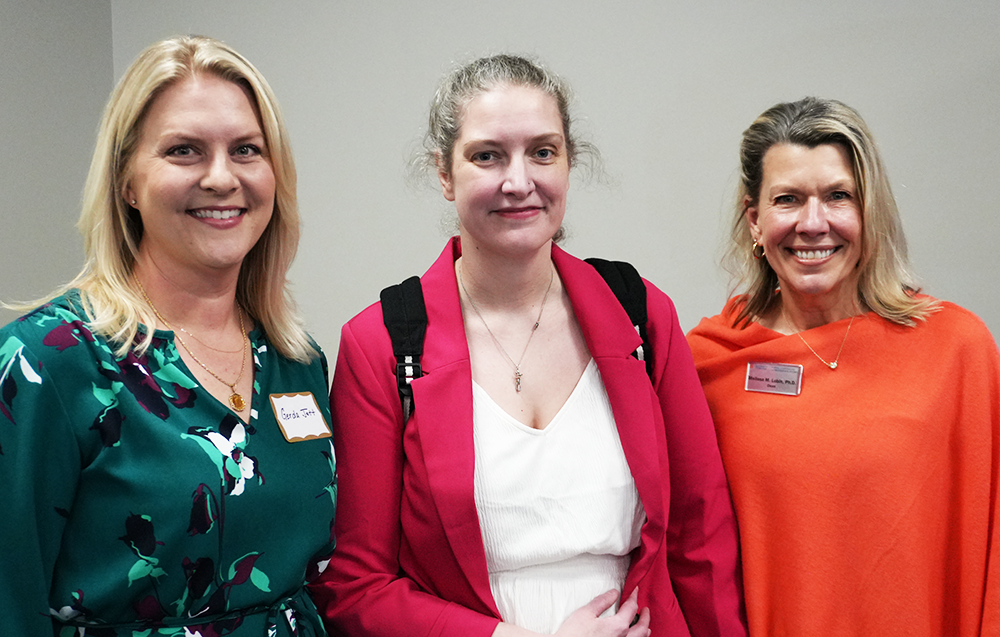The directory below can help you find everything you need to get started at UVA, find support within and outside of your courses, and explore all of the opportunities open to you as a UVA student.
Academic Resources & Policies
- Academic & Disabilities Services
-
It is the policy of the University of Virginia to accommodate students with disabilities in accordance with federal and state laws. Any student with a disability enrolled through the School of Continuing and Professional Studies who needs accommodation (e.g., in arrangements for seating, extended time for examinations, or note-taking, etc.), should contact the Student Disability Access Center and provide them with appropriate medical or psychological documentation of his/her condition. Once accommodations are provided, it is the student’s responsibility to follow up with the instructor about logistics and implementation of accommodations.
If students have difficulty accessing any part of the course materials or activities for their classes, they should contact the instructor immediately. Accommodations for test-taking should be arranged at least 14 business days in advance of the date of the test(s). A student’s academic dean is also available to assist with accommodations, particularly for temporary or emergency situations. Please email SCPSaccommodation@virginia.edu
Students with disabilities are encouraged to contact the Student Disability Access Center.
- Academic Grievance
-
Grade Appeals
Students who wish to appeal a grade must first attempt to resolve the issue with the instructor of the class. Absent a satisfactory outcome, the student consults with the program’s senior program director. If this path proves unsuccessful in the resolution of the matter, the student may appeal to the Associate Dean for Academic Programs. The associate dean’s decision is final. At each stage of their appeal, students should provide any supporting documentation they believe is important to their appeal. Appeals must be initiated within one month of the final date by which grades are posted for the term in question.
Other Academic Grievance
Students who have a grievance related to a course, with a faculty member, or related to the services provided by SCPS faculty or staff should pursue the grievance as follows:
- The grievance should be filed with the Associate Dean for Academic Programs, who will adjudicate the case. If this unit head is a party to the case or is otherwise unable to serve, the grievance should be filed with the school’s dean.
- The SCPS unit head will initially investigate the complaint. Investigation will include but is not limited to reviewing relevant documentation and meeting with the student and the faculty member or University official who made the decision being contested. Within thirty (30) calendar days after receiving the grievance, the SCPS academic unit head will communicate in writing her/his recommendation to both the student and the faculty member or official.
- Attendance
-
Students are expected to attend all class sessions. Instructors establish attendance and participation requirements for each of their classes. Course requirements, regardless of delivery mode, are not waived due to a student’s absence from class. Instructors will require students to make up any missed coursework and may deny credit to any student whose absences are excessive. Poor attendance may result in the student receiving a failing grade. Instructors must keep an attendance record for each student enrolled in the class to document attendance and participation in the class.
- Auditing a Class
-
Students who wish to audit a course (enroll in credit courses without earning academic credit) may do so on a space available basis, with the permission of the instructor and program director. Credit or audit status must be indicated at the time of registration. Admission requirements are the same for auditing students as for students enrolled for credit.
An AU (audit) cannot be changed to a letter grade. Auditing a class does not relieve the student of the responsibility for meeting the standards established for the course. A grade of W is recorded for any student who discontinues the audit after the drop deadline or who fails to meet the instructor’s standards. Students who audit courses are responsible for full payment of tuition and fees. - Grades
-
The quickest and easiest way to obtain grades at the University of Virginia is for the student to do so by accessing SIS (the Student Information System). Students have 24-hour access to their academic information through SIS. The student may also order an official transcript through the Office of the University Registrar (UREG).
Courses carrying a School of Continuing and Professional Studies subject area (mnemonic) use the following grading system: A+, A, A-; B+, B, B-; C+, C, C-; D+, D, D-; F. S (satisfactory) and U (unsatisfactory) are used for some course offerings. For noncredit courses, the grade notation is N (no credit). Students who audit courses receive the designation AU (audit). The symbol W is used when a student officially drops a course before its completion or if the student withdraws from an academic program of the University.
When the School of Continuing and Professional Studies offers courses in collaboration with other schools of the University, these courses follow the grading system of their associated schools, as outlined in each school’s section of the Record.
Credit/No Credit Students enrolled in degree programs in other schools of the University of Virginia should consult with the appropriate school before selecting the credit/no credit (CR/NC) grading option. Students enrolled in certain courses for professional development may select the CR/NC option. Courses taken with this grading option may not be transferred into a degree program.
Grade Changes No grade may be changed after it has been submitted to UREG (Office of the University Registrar) without the approval of the school’s dean or dean’s designee. The dean or designee may authorize a grade change only in accordance with the school’s grade appeal policy or when an instructor certifies that, because of an error in calculation or transcription, an incorrect grade has been submitted. Grades cannot be changed after a degree is conferred, or more than one semester following the end of the course, whichever comes first. The dean or his/her designee is also authorized to change incomplete or missing grades to an F or Withdrawal. Instructors must submit grade changes via the Student Information System (SIS). Please also see Incomplete Grades section.
Incompletes A grade of incomplete (IN) should be a rare occurrence. If late in the term, circumstances arise beyond a student’s control and all other coursework is complete, the student and instructional faculty may negotiate an extension for submission of final coursework. Prior to the final class, the student must request an IN from the instructional faculty in writing; the instructional faculty must initiate the SCPS Request for a Grade of Incomplete Form and submit the signed form to the SCPS Registrar. The student must complete all course requirements and submit the completed work to the instructional faculty by the faculty’s imposed deadline, at which time the faculty replaces the IN with a letter grade. Typical extensions are for no more than 30 to 60 days beyond the final class meeting. If the work is not completed by the designated agreed upon deadline and a letter grade is not entered, the IN automatically defaults to an ‘F’. Only in extreme cases will this deadline be extended; extensions require approval of the SCPS Registrar or the Associate Dean for Student Services & Enrollment Management. A degree or certificate will not be awarded while an Incomplete grade remains on the transcript. A student may not request an Incomplete in an attempt to raise his or her grade. An incomplete that is not removed by the assigned date will be converted to a grade of F (failure). Only the appropriate instructor may authorize removal of an Incomplete designation. Degree-seeking students who receive an IN (incomplete) or an F (failure) in any course cannot enroll in another course unless the Dean of the School of Continuing and Professional Studies grants permission. - Leave of Absence
-
Degree-seeking students who wish to take a one-semester leave of absence must apply for such leave by completing the "Leaving the University" form in the SIS Student Center and seeking approval from their academic advisor and the program director. Degree-seeking students who wish to take a leave of absence for a second consecutive semester should follow the same process and the request must be approved by the academic advisor and program director. Students on approved leaves of absence are not required to apply for readmission prior to their return, but they should notify their academic advisor and program director of their intended return at least 30 days before the open registration date for that semester.
Students enrolled in professional certificate programs should notify their program director or administrator should they wish to take a one-semester leave of absence. No official forms are required to be filed. - Student Information System
-
SIS is the University of Virginia’s centrally-supported Student Information System. Visit the SIS Help Center to familiarize yourself with the vast array of resources for students, including information on getting started, searching for classes, student finances, and more.
- Students in Distress
-
Recognizing & Assisting Students in Distress: A Guide for Faculty & Teaching Assistants
For many students at the University, personal and academic pursuits provide healthy experiences with positive results. However, for some, high levels of psychological distress and/or risky behaviors, such as alcohol or other drug abuse, occur during the academic year. As a faculty member or teaching assistant (TA), your on-going relationship with students allows you to detect changes in an individual’s behavior that may signal a more serious problem.
You can play a unique role in assisting students through a difficult situation or experience. Students appreciate faculty and TA opinions and you can serve as a reliable source of information about the resources already in place to help them. Faculty and TAs are not expected to diagnose the source of distress or take on the role of counselor. The steps below can help you identify students in need of assistance and provide appropriate referral.
As of July 1, 2015, Virginia state law requires faculty and staff to notify Counseling and Psychological Services (CAPS) when a student exhibits suicidal tendencies or behavior. If you have any concerns that a student may be suicidal, notify CAPS immediately.
1. Be alert to signs of difficulty.
Academic indicators may include:- Deterioration in quality of work
- A drop in grades
- A negative change in performance
- Repeated requests for extensions
- Missed assignments
- Repeated absences
- Disorganized or erratic performance
- Essays or creative work that indicate extremes of hopelessness, social isolation, rage, fear or despair
Communication indicators may include:
- Direct statements indicating distress, abuse, personal problems or other difficulties
- Disproportionate anger or hostility
- Becoming more withdrawn or more animated than usual
- Tearfulness
- Expressions of hopelessness, helplessness, fear or worthlessness
- Expressions of concern about a student in the class by peers
- Marked changes in eye contact
- Substantial withdrawal from others
Physical indicators may include:
- Deterioration in physical appearance or worsening personal hygiene
- Visible marks on the body
- Excessive fatigue
- Visible changes in weight
- Coming to class bleary-eyed, hung over or smelling of alcohol
Safety risk indicators may include:
- Written or verbal statements showing a sense of finality or a suicidal tone*
- Written or verbal communications that indicate fear or abuse by another
- Previous suicide attempts, violent behaviors (directed at others or objects) or preoccupation with death*
- Statements to the effect that the student is "going away for a long time" or giving away possessions*
- Self-injurious or self-destructive behaviors
* Under state law, any of these indicators require CAPS notification.
2. Trust your instincts and take these signs seriously. If you are concerned about a student, it is important to voice your concerns. Do not question or second-guess your instincts. Contact the Office of the Dean of Students or CAPS immediately to discuss possible courses of action or intervention.
3. In talking with the student, share your concerns. Remember that talking about a problem does not make it worse. This is the first step toward resolution. Specifically point out signs you’ve observed and ask what is wrong.
"I wanted to talk to you because I notice you've been late recently, you no longer participate in class, and you seem distressed. I'm concerned about you. Would you like to know about some of the confidential resources on Grounds?”
4. Listen carefully. Many students will have trouble articulating their difficulties. Be available. Try not to get upset or communicate your own personal judgments. It is not always about having the “right” thing to say, but rather to show care, compassion, and empathy. Sometimes what is not said is as important as what is said.
5. Assist the student in getting help. Encourage the student to seek professional assistance. You may need to address the student's concerns about counseling:- "Most mental health services are covered to different degrees by health insurance."
- "If you like, we can call to find options for you now.”
- "Recognizing and being willing to get help for a difficult situation is a sign of strength.”
6. Recognize an emergency situation. An emergency means that the student's basic safety is jeopardized. This may include severe eating disorders, severe substance abuse, suicidal thoughts, or a serious threat from another person. Remember that you are required by state law to notify CAPS of any student exhibiting suicidal tendencies or behavior. Obvious examples that require such notification are marked (*) in section 1. If you are worried about imminent harm, stay with the student and call 911 immediately and then follow up with CAPS. Police are well-trained in psychiatric emergencies and can take students to the Emergency Room for a full psychiatric consultation immediately.
7. Respect confidentiality. Do not discuss the student's name or problem in public areas or with anyone who does not have a direct need to know this information. When talking with the student, avoid making sweeping promises of confidentiality. Students who are suicidal need swift professional intervention. Pledges of absolute confidentiality are not consistent with state law reporting requirements and may make a serious situation more difficult.
8. Follow up. Check in with the student to see if the student is receiving adequate help. Often, students feel even more supported by the follow-up expression of concern than the initial contact.
Developed by the University Advisory Committee on Alcohol and Substance Abuse (2000). Based on materials from the College of William and Mary and SUNY at Cortland. Revised August, 2015.
Counseling and Psychological Services (CAPS)
M-F daytime on-call clinician 434.243.5150
After hours & weekend emergency 434.972.7004 - Textbooks
-
Textbook information: Title, Author, ISBN, Edition, Date of Publication, etc., will be available in the class overview found in UVACollab, two weeks prior to the start of the class. Students can view their required and recommended textbooks, and purchase them from any online or local vendor.
Students in Charlottesville may purchase required and recommended textbooks from the UVA Bookstore or any online or local vendor. - Transcripts
-
The Office of the University Registrar (UREG) records credits, grades, and CEUs (Continuing Education Units) for University courses taught in the School of Continuing and Professional Studies. Official transcripts are available from the office of the University Registrar.
Current students may view their unofficial transcripts by logging into their student center in the Student Information System.
Former students (enrolled in a class since 1985) may access their unofficial transcripts by following the appropriate steps. - SCPS Program Contacts
-
We are here to help you along the way and provide support when you need it. From time to time, you may have questions about your program, courses or scheduling. Here’s a guide with our contact information to make it easy for you to reach out to us with your questions or concerns.
Programs Contact Accounting
Cindy Lu, 703.712.6763, yl8b@virginia.edu Bachelor of Interdisciplinary Studies
Susan Chisholm, 434.982.5244, sf7x@virginia.edu Bachelor of Professional Studies in Health Sciences Management
Susan Chisholm, 434.982.5244, sf7x@virginia.edu Certified Financial Planning
Cindy Lu, 703.712.6763, yl8b@virginia.edu Cloud Computing
Thea Litchfield Campbell, 434.996.7276, tlcampbell@virginia.edu Cybersecurity Analysis (undergraduate)
Thea Litchfield Campbell, 434.996.7276, tlcampbell@virginia.edu Cybersecurity Management (graduate)
Thea Litchfield Campbell, 434.996.7276, tlcampbell@virginia.edu Healthcare Management
Susan Chisholm, 434.982.5244, sf7x@virginia.edu Information Technology
Thea Litchfield Campbell, 434.996.7276, tlcampbell@virginia.edu Leadership
Cindy Lu, 703.712.6763, yl8b@virginia.edu Leadership in Human Resources Management
Thea Litchfield Campbell, 434.996.7276, tlcampbell@virginia.edu Master of Public Safety
Bryon Gustafson, bgg3a@virginia.edu National Criminal Justice Command College
Anne Johnston, jrm8ge@virginia.edu Procurement & Contracts Management
Cindy Lu, 703.712.6763, yl8b@virginia.edu Project Management
Thea Litchfield Campbell, 434.996.7276, tlcampbell@virginia.edu Public Administration
Cindy Lu, 703.712.6763, yl8b@virginia.edu UVA Edge
Alexa Jeffress, akh4ev@virginia.edu - UVA Canvas
-
UVA Canvas is the centrally-supported Learning Management System (LMS) at the University of Virginia. All courses at SCPS, whether in-person or online, will have a course site in Canvas.
- Other Academic Resources and Policies
-
- Academic Credit
- Add/Drop/Withdrawal
- Arrest/Convictions Reporting Form
- Bias Reporting
- Canvas
- Current Class Offerings
- Drug & Alcohol Use
- Firearms
- Form for Matriculated BIS Students to Request Transfer Credit Posting
- Form for Matriculated BPHM Students to Request Transfer Credit Posting
- Hazing
- Honor at UVA
- Learning Environments
- Nondiscrimination/EEO/AA
- Not on Our Grounds
- Office of the Dean
- Privacy of Academic Records
- Recording Lectures/Distributing Course Materials
- Registrar
- Registration
- Respect@UVA
- Sexual Violence: Education & Resources
- Student Rights & Responsibilities
- TOEFL
- Undergraduate/Graduate Record
- Certificate Program Elective Credit Limitation: All UVA School of Continuing and Professional Studies courses taken as part of completing a certificate program cannot be double counted toward another SCPS certificate program. In cases where electives may overlap across programs, students are expected to choose distinct electives to satisfy subsequent certificates.

Getting Settled & Activities
- Student ID Card
-
UVA Student ID Cards are issued to students in the School's degree and certificate programs as well as the Post Bacc Pre-Medical program. Students in these programs can use their Student ID cards to access privileges associated with their programs and/or comprehensive fees. These privileges and services may vary by program.
Students who are University of Virginia employees do not need to have a UVA Student ID.
All ID cards are the property of the University of Virginia and are provided for appropriate use for identification and access to services. The card is not transferable and is valid as long as the holder continues his/her specific affiliation with the University of Virginia. Any misuse, alteration, or fabrication of the card will subject the holder to disciplinary action by the University.UVA Mobile ID
All UVA students, faculty, and staff can now activate the new UVA Mobile ID Wallet app on your iPhone or Android device to use in place of your physical UVA Academic ID card. Once activated, the UVA Mobile ID Wallet enables your personal mobile device to be used as your University ID. All UVA students, faculty, and staff must choose between accessing the UVA Mobile ID Wallet or keeping your existing (or obtaining a new ) physical UVA Academic ID card. Once you activate the UVA Mobile ID Wallet, your physical UVA Academic ID card immediately stops functioning.
- Orientation
-
SCPS offers orientation for new students. Your program will communicate details with you after enrollment.
- UVA Arts & Recreation
-
UVA Student ID Cards are issued ONLY to students in the Bachelor of Interdisciplinary Studies program (Charlottesville, on-Grounds cohort only) and the Post Bacc Pre-Medical Program. Students in these programs can use their Student ID cards to access privileges associated with the arts, and recreation and fitness facilities.
Arts: BIS Students receive $75 in ARTS$ for any UVA function accepting ARTS$ (e.g., plays, concerts, art exhibits). $15 can be applied to the fall Charlottesville Film Festival. A valid UVA Student ID must be presented at the time of ticket purchase.
Recreation & Fitness Facilities: All University facilities are free for use by students with a valid UVA Student ID. Visit Intramural-Recreation Sports for a complete listing of facilities, activities, and options for spouses and family members.
Note: Students who are enrolled in other SCPS programs and courses are not entitled to these privileges. - SCPS Student Activities
- Safety
-
Charlottesville is a beautiful small city (population 40,000) nestled in the foothills of the Blue Ridge Mountains in central Virginia. It is frequently at the top of popular rankings for the “best places to live.” The presence of the University of Virginia’s vibrant community of students, faculty, and staff is one of the primary reasons that this area thrives.
The safety and well-being of our students is among our highest priorities at the University of Virginia. We are committed to assisting all members of our community in providing for their own safety and security. Our safety program includes:- The University Police Department (UPD), a professional police department that provides the same level of service offered by a municipal police department along with other services unique to an academic institution. UPD participates in a mutual aid agreement with other local departments and a cooperative patrol agreement with the City of Charlottesville.
- Ambassadors Program, a service that provides extra eyes and ears on the streets and assistance including walking escorts in neighborhoods frequented by students
- University Transit Service (UTS) bus system that has an annual ridership greater than 3 million
- SafeRide shuttle program during hours when UTS buses are not operating
- Yellow Cab Charge-a-Ride program available with student ID
- Educational seminars, bystander training, and self-defense classes
- More than 500 blue light emergency phones
- Lighted pathways and ongoing inspection of buildings and the Grounds
- Security cameras strategically placed around the Grounds
- Card key system for access to residence halls at all times and other buildings during designated hours
- UVAAlerts emergency notification system, sirens and public address system
- Fire alarm and suppression systems
Annual Security and Fire Safety Report
Federal law requires the University to publish an Annual Security and Fire Safety Report. The report includes information on crime prevention, fire safety, University Police law enforcement authority, crime reporting policies, and statistics about crimes that occurred during the previous three years on Grounds or in designated areas near Grounds as well as in other locations specified by law. The document is available on the University’s Clery Act website. You may request a hard copy of the report from the University by writing to clery@virginia.edu.
Duty to Report Arrests & Convictions
Since 2004, the University of Virginia has required that students disclose relevant arrests or convictions. The change that occurred in 2011 involves taking an active rather than passive approach to pointing out to students their obligation to promptly and truthfully provide this information. In an effort to facilitate this process, the School of Continuing and Professional Studies provides an email address for our students to report. All information is reviewed by the Office of the Dean of Students.
Please review the information from the Office of the Dean of Students to learn more.
If you need to report an arrest or conviction, please do so by filling out the Arrests & Convictions Reporting form.
- Other Getting Settled Resources





